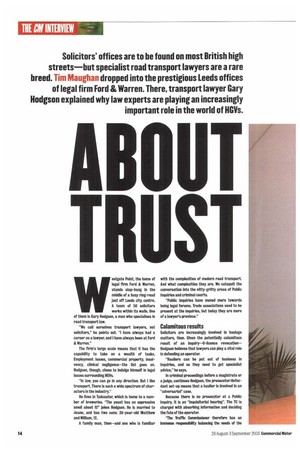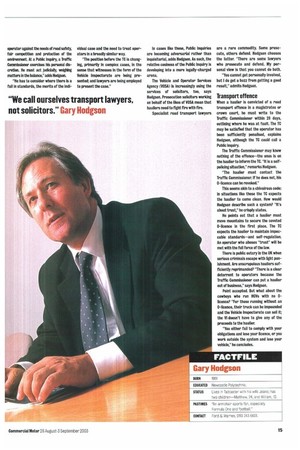Mr estP,ate Point, the home of legal firm Ford & Warren,
Page 14

Page 15

If you've noticed an error in this article please click here to report it so we can fix it.
stands slap-bang in the middle of a busy ring-road Just off Leeds city centre. A team of 50 solicitors works within its walls. One of them is Gary Hodgson, a man who specialises in road transport law.
"We call ourselves transport lawyers, not solicitors," he points out. "I have always had a career as a lawyer, and I have always been at Ford & Warren."
The firm's large scale means that It has the capability to take on a wealth of tasks. Employment Issues, commercial property, insolvency, clinical negligence—the list goes on. Hodgson, though, chose to indulge himself in legal Issues surrounding HGVs.
In law, you can go in any direction. But I like transport. There is such a wide spectrum of characters in the industry."
He lives in Tadcaster, which is home to a number of breweries. ''The yeast has an oppressive smell about it' Jokes Hodgson. He is married to Jeane, and has two sons: 24-year-old Matthew and William.12.
A family man, then—and one who Is familiar with the complexities of modern road transport. And what complexities they are. We catapult the conversation into the nitty-gritty areas of Public Inquiries and criminal courts.
"Public Inquiries have moved more towards being legal forums. Trade associations used to be present at the inquiries, but today they are more of a lawyer's province."
Calamitous results
Solicitors are increasingly involved in haulage matters, then. Given the potentially calamitous result of an inquiry-0-licence revocation— Hodgson believes that lawyers can play a vital role In defending an operator.
"Hauliers can be put out of business in Inquiries, and so they need to get specialist advice," he says.
In criminal proceedings before a magistrate or a judge, continues Hodgson, the prosecutor/defendant set-up means that a haulier is involved in an "adversarial" case.
Because there is no prosecutor at a Public Inquiry, it is an "inquisitorial hearing". The IC is charged with absorbing information and deciding the fate of the operator.
'The Traffic Commis sion& therefore has an immense responsibility balancing the needs of the operator against the needs of road safety, fair competition and protection of the environment. At a Public Inquiry, a Traffic Commissioner exercises his personal discretion. He must act Judicially, weighing matters in the balance," adds Hodgson.
"He has to consider where there is a fall in standards, the merits of the indi
vidual case and the need to treat operators in a broadly similar way.
The position before the IC is changing, primarily in complex cases, in the sense that witnesses in the form of the Vehicle Inspectorate are being presented; and lawyers are being employed to present the case," In cases like these, Public Inquiries are becoming adversarial rather than inquisitorial, adds Hodgson. As such, the relative cosiness of the Public Inquiry is developing into a more legally-charged arena.
The Vehicle and Operator Services Agency (VOSA) Is increasingly using the services of solicitors, too, says Hodgson. Prosecution solicitors working on behalf of the likes of VOSA mean that hauliers need to fight fire with fire, Specialist road transport lawyers are a rare commodity. Some prosecute, others defend. Hodgson chooses the latter. "There are some lawyers who prosecute and defend. My personal view is that you cannot do both.
You cannot get personally involved, but I do get a buzz from getting a good result," admits Hodgson.
Transport offence
When a haulier is convicted of a road transport offence in a magistrates or crown court, he must write to the Traffic Commissioner within 28 days, outlining where he was at fault. The TO may be satisfied that the operator has been sufficiently penalised, explains Hodgson, although the IC could call a Public inquiry.
The Traffic Commissioner may know nothing of the offence—the onus is on the haulier to inform the IC. "It is a selfpolicing situation," remarks Hodgson.
"The haulier must contact the Traffic Commissioner. If he does not, his 0-licence can be revoked."
This seems akin to a chivalrous code: In situations like these the IC expects the haulier to come clean. How would Hodgson describe such a system? "It's about trust," he crisply states.
He points out that a haulier must move mountains to secure the coveted 0-licence in the first place. The TO expects the haulier to maintain impeccable standards—and serf-regulation. An operator who abuses "trust" will be met with the full force of the law.
There is public outcry In the UK when serious criminals escape with light punishment. Are unscrupulous hauliers sufficiently reprimanded? "There is a clear deterrent to operators because the Traffic Commissioner can put a haulier out of business," says Hodgson.
Point accepted. But what about the cowboys who run IIGVs with no 0licence? "For those running without an 0-licence, their truck can be impounded and the Vehicle Inspectorate can sell it; the Vi doesn't have to give any of the proceeds to the haulier.
"You either fail to comply with your obligations and lose your licence, or you work outside the system and lose your vehicle," he concludes.




































































































































































